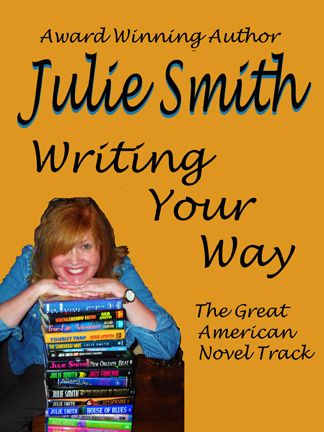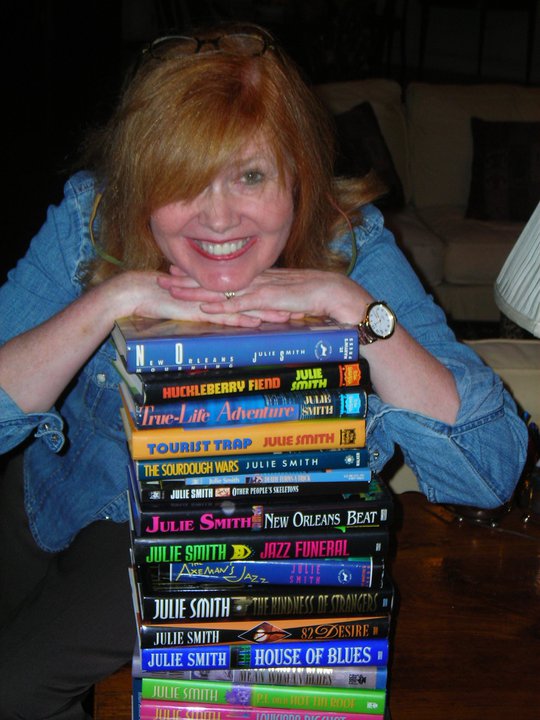 My special guest is Julie Smith, author of the how-to book, Writing Your Way: The Great American Novel Track.
My special guest is Julie Smith, author of the how-to book, Writing Your Way: The Great American Novel Track.
Julie is an accomplished author and writing educator who focuses on helping authors find their own unique writing method and voice, rather than imposing draconian rules that simply do not work for all writers. Nonetheless, the book is full of advice on many topics related to writing fiction, including plot, character, setting, voice, point-of-view, dialogue, and pacing.
She even includes tips on an aspect of increasing importance to fiction writers in the evolving world of publication: marketing.
Finding Your Inner Scheherazade
by
Julie Smith
When haven’t there been stories? And when haven’t they been important to us? Never, maybe.
The Egyptians had books; the Mayans had books. But I wonder if the oldest books of all were aboriginal cave symbols — because we know that Australian peoples painted them there to help the storyteller remember his narrative.
Well, that was ridiculously early. Then came legends, myths, and fairy tales. And the first metatales — stories about stories, in the form of One Thousand and One Nights, in which Scheherazade saves her life each night by telling her murderous husband a new story.
Who among us doesn’t want to be Scheherazade? Our own version of the spellbinder nobody can resist.
As someone who makes my living writing — and therefore has to admit it publicly on a regular basis — let me say that I think it’s pretty universal. Everyone (well, let’s say about 97% of the people I meet) says they’ve always wanted to be a writer but just didn’t have time, didn’t know what story to tell, or does know, has a really really great story but can’t for some reason write it, so they’ll split the money if I’ll write it.
This stuff happens so often I wonder if it’s a basic human urge, right up there with eating, sex, and football in the fall. And people believe they can do it without a path to follow, a course to take, a set of skills to use. If they speak English, they can write English. The good news is, a lot of those people are right; they’re natural storytellers who listened very, very carefully to those boring third grade grammar classes.
But most can’t do it without a little guidance. And so, after writing twenty novels of my own, I wrote Writing Your Way. It began as a class, originally, so my task became, how best to help people realize their dream? How to help them tell that story they’re dying to tell, or, if they don’t yet have it, how to help them find it?
I read up on the subject and found that all writing books seemed to have one common thread — almost to a person, every self-styled writing teacher has a system and thinks you should follow it. In “how-to” mode, they all turn into Prose Nazis, absolutely convinced that their way is the one true way.
But, wait, I thought, that can’t be! Because a lot of these people were actually successful novelists, and they all had different methods. So that had to mean there was no one way to write a novel. Thus my job had just morphed into how to help each person find his or her own best method. Oh, and to teach them a bit of craft too. But ever so gently — I’d be nice Aunt Julie, not the Prose Nazi.
So off I went to do it and what do you know? My students’ first efforts weren’t that hot. Well, the short stories were, but of those writing novels, just about a hundred per cent would have failed “How to Write a First Chapter” if anyone was grading.
Which means I’d kind of failed as a writing teacher. Yow. Imagine my embarrassment. I’d left out something really really important! So when I “re-purposed” the course as a writing book, I made damn sure I covered it. What kind of a storyteller would I be if I didn’t tell you what it was?
Okay, if you’re an aspiring or struggling newbie, here’s the single best piece of advice I have for you: Start in the middle. Bring up questions: “Last night I dreamt I when to Manderley again?” What the hell is Manderley? “Call me Ishmael.” Okay, but who are you? How’d I get in this conversation?
Start in the middle, or anyway not at the very beginning, and forge ahead, keeping in mind the three big first-chapter no’s: No exposition, no flashbacks, no digressions.
And no exceptions.
If you’ve already written that chapter, and you’ve included all that stuff, what now? Don’t despair. All is not lost. Take it out and sprinkle it in the next few chapters. Cut relentlessly; pare prodigiously; slash savagely!
Hey, what’s this? Did I just turn into a Prose Nazi?
Don’t be silly, dear. Of course not, I just had a moment. I’m your nice Aunt Julie and I can help you. I have a Facebook group called ,a href=” http://on.fb.me/w3ebsn” target=”_blank”>writing You Way (like the title of the book) where I’m committed to answering your writing questions. So ask away and we’ll see if Aunt Julie can direct you to your inner Scheherazade. You never know — storytelling could save your life!
Meet Julie

Julie is the veteran of her own online writing school and an editorial service she founded with two other writers. She has taught writing at the University of New Orleans and in numerous private seminars.
During her long career as a novelist, Julie has created four mystery series, including two set in New Orleans where she lives, featuring homicide detective Skip Langdon and poet/P.I. Talba Wallis. In 1991, she won the prestigious Edgar Allan Poe Award for Best Novel.
Counting all the novels, all the stories in all the anthologies, the odd essay, and a progressive novel or so, her publishers include just about every big publisher – Ballantine, St. Martin’s, Tor, Walker & Company, Knopf, Doubleday, Avon, Harper-Collins, Berkley, Warner, and Oxford University Press – plus some smaller ones, including Akashic Books, Carrol & Graf, Allen & Unwin, Taplinger, and Four Star.
Connect with Julie on her website, or follow her on Facebook or Twitter. Drop her a line: Julie at booksbnimble dot com.



2 Comments
I enjoyed Aunt Julie’s guest post. 😉 Looking forward to tomorrow’s giveaway too. Thank you.
This was a fantastic tease for the book! I have been needing that next little nudge to get my languishing novel started again, and this article provided some great food for thought.
How could I resist with Sheherazade in the title?